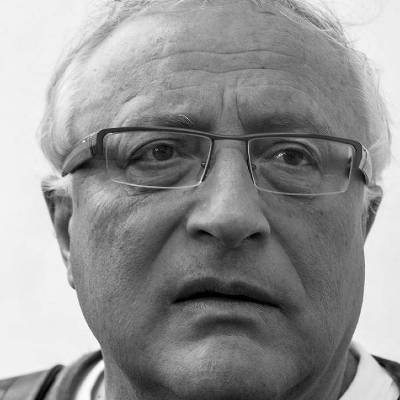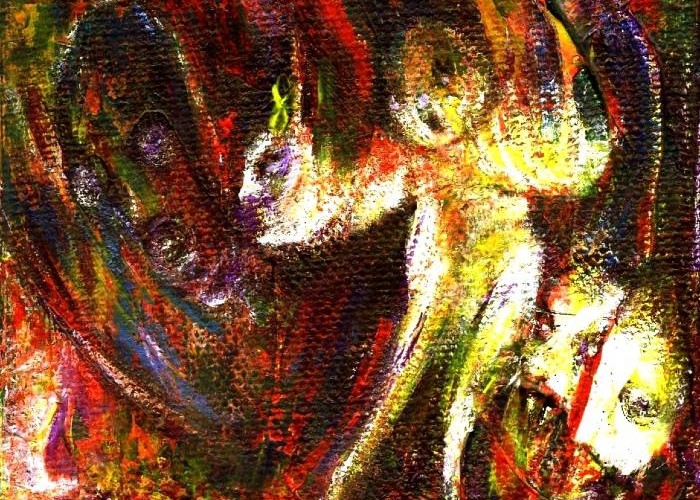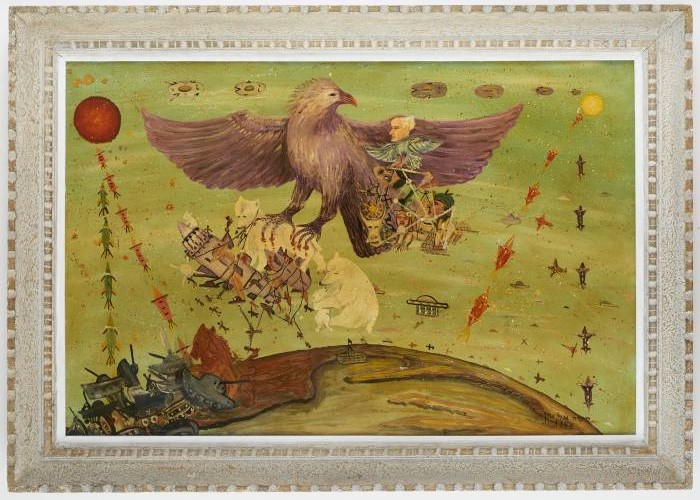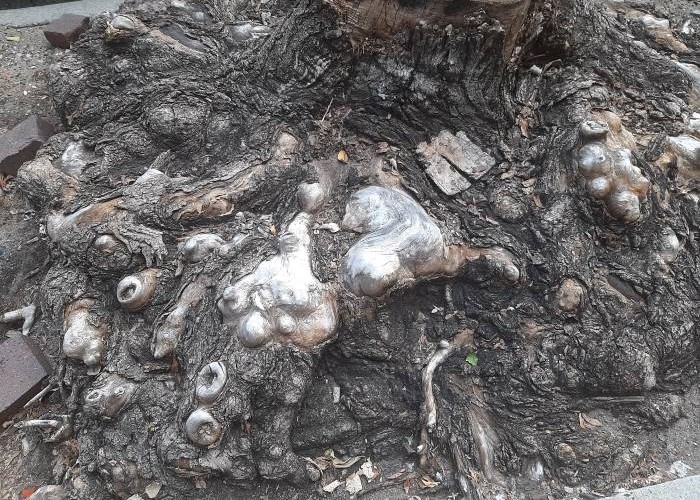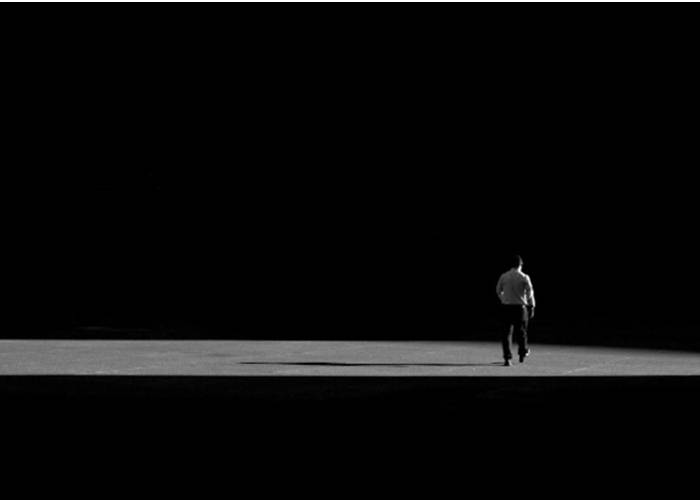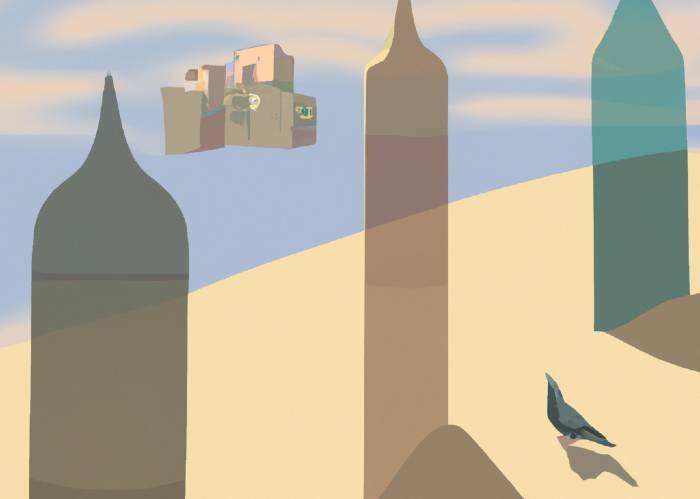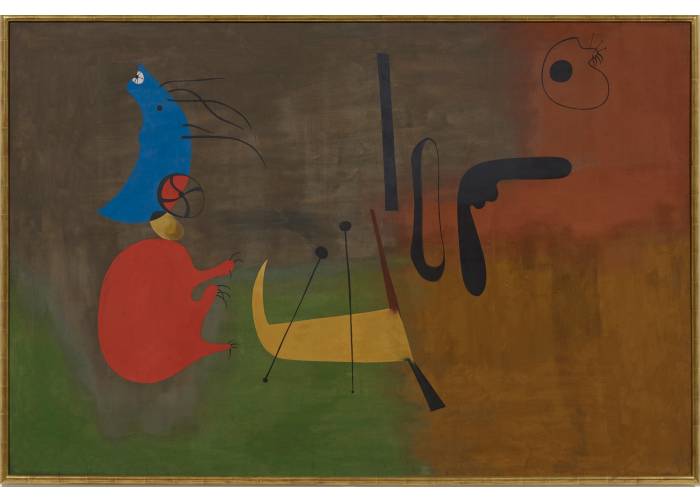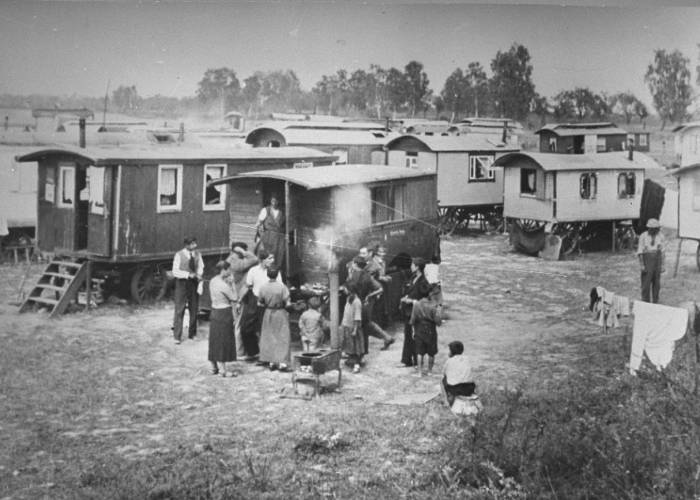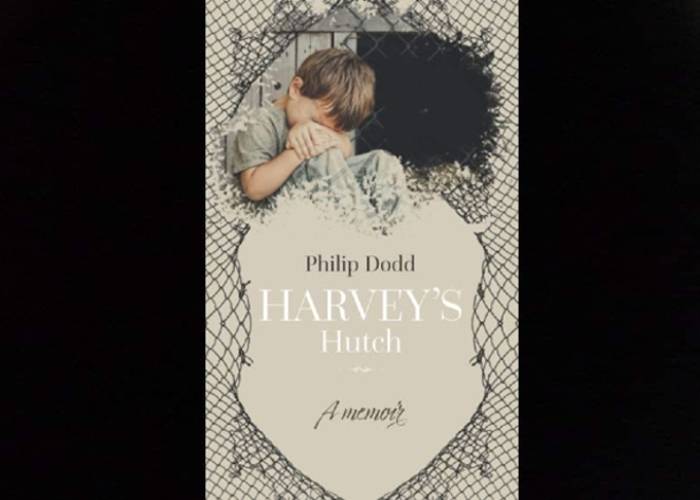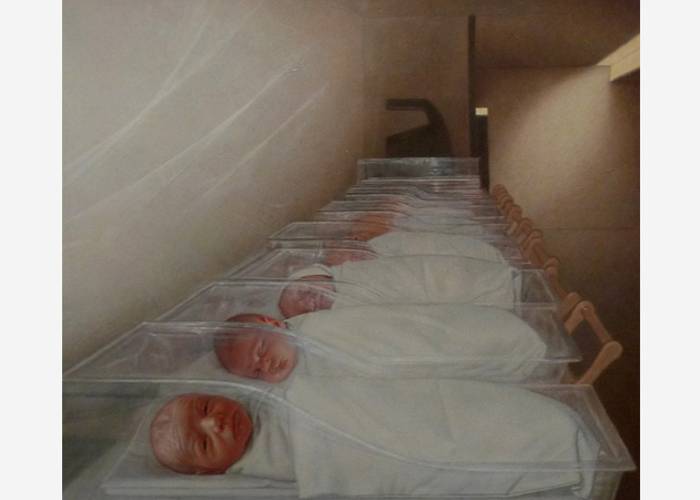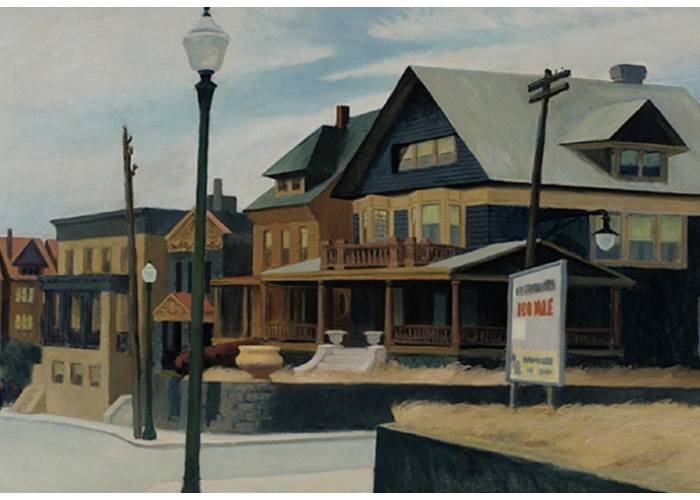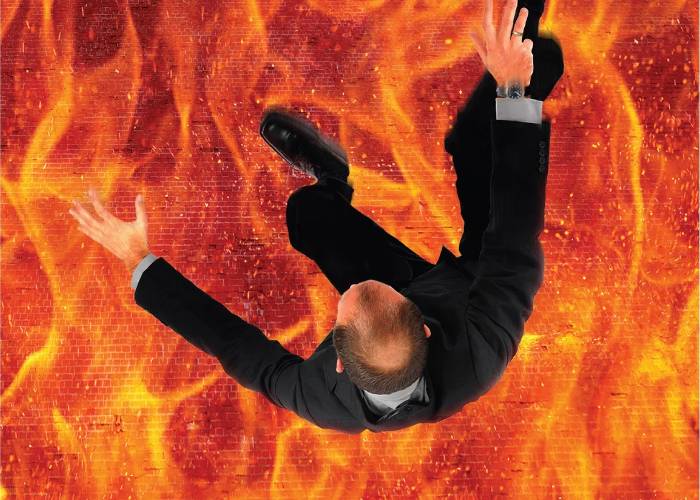This was an incidental encounter, although in our mysterious realm, nothing incidental ever happens. It was an encounter with Edgar Allan Poe himself. I lived in his world since my childhood, so there was nothing surprising that in the end we were bound to meet. I’ve heard for a long time that Poe sometimes appears in our area, the Upper West Side of Manhattan, perhaps to visit his own place of habitat, to sit down and watch the Hudson River from his favorite spot in Riverside Park. He called it “Mount Tom.”
Thеre is a cliff ledge in the Riverside Park at 83d Street. In his time, he used to sit there for hours, watching the panorama of the lower Hudson Valley. Poe himself called the view “sublime.” This cliff was very close to the farmhouse where Poe stayed with the Brennan family. This is why Edgar Poe called this cliff “Mount Tom,” named after Brennan’s son. This farmhouse was where Poe composed his famous “The Raven” and “The Premature Burial.” Perhaps he is still drawn to this place in order to finish writing something new—who knows?
This is where we met for the first time, at the site of the farmhouse. To please the Master, I took him to Edgar’s Café at Eighty-fourth Street—a cavernous, dark place in a prewar building from the beginning of the twentieth century, on Amsterdam Avenue. We sat at a small table, and Edgar looked casually but with interest at his own portrait hanging on a wall. I asked the waitress for Amontillado, and a Spanish-speaking girl brought quite a decent variant of this old beverage. Edgar tasted it, but preferred something stronger. I proposed Glenlivet, but Edgar (I am going to call the great Master “Edgar” for simplicity) said that he preferred our own domestic drinks, and I ordered bourbon from Kentucky. No ice. Matter-of-factly, he inquired if it was possible to send someone for some opium. I answered that it was absolutely impossible and quite undesirable. Cocaine and heroin—these were possible, but not here, and I did not recommend to do any of it in this city. Edgar was unhappy and murmured something that sounded like “What has this city turned into!”
At this very moment three Upper West Side dames entered the café, with those typical plastic surgical smiles and bags from Prada, obviously to exchange the news. Unexpectedly, Edgar got up and without any hesitation started reciting “The Raven.” The thing is that after publication of this incredible poem, he became very popular in New York City, and the ladies, even from the high echelons of the society, constantly requested that he read “The Raven” in public places. As a result, all of New York recited ominously, “Nevermore!”
The ladies put their prosecco on their little table and looked, bewildered, at the strange moustachioed gentleman dressed all in black and strangely reminiscent of the portrait on the café wall. One of them suddenly recalled that she took a course on American classics at Wesleyan (it was still an obligatory course in the Humanities and was not yet pushed back, as nowadays, in the process of correction and modernization of the Humanities program. As they say now, “an unadulterated progressive program”). I managed to distract Edgar with prices on the menu and to return him to his seat.
After the first gulp, as it goes, our conversation became livelier. Edgar became more interested, open, and stated that he could never understand why no one could understand that his famous “The Raven” was based on a real story, like everything else he had written. And that “The Raven” was constructed using a precise mathematical concept.
I nodded agreeably and proposed to familiarize him with Russian writers’ opinions of him. I translated for him a quote from Osip Mandelstam: “Russia is not America, and we don’t have that philological influx, therefore an outlandish poet such as Edgar Poe could not germinate here, as a tree from a palm seed, transported over the ocean on a ship.”
Poe liked the idea, and I ventured to show him a translation of Mandelstam’s poem: “We can’t bear that stressful silence… Edgar’s harp was singing of House of Usher. The madman drank his water, woke up and fell silent.” Well, I felt that I’d achieved a lot! Edgar was fond of Mandelstam.
However, Poe turned skeptical hearing me quote Mandelstam on Whitman: “America is better than this still comprehensible Europe. America spent all its philological stock, transported from Europe, got mad, pondered, and invented its own philology. It dug out Walt Whitman from somewhere, and like a new Adam, he started giving names to things, to his surroundings, and he has given an example of ancient nomenclature poetry similar to Homer himself”. Poe exclaimed: ‘Whitman! This is just a superficial description of the outside world! What does he have inside? What kind of description is this: —of nature, anatomy? He is scared to look deeper into the dark bottom of the soul!’”
He became very excited about Alexander Blok’s poem “There was an autumn evening”: “She is still the same: Lenore of the mad Edgar. There is no return.” He especially liked: “It is time to come to terms with fate’s genius, Sir.” He was not embarrassed or surprised by the definition of “mad.” I was not surprised either. I left Whitman alone, ordered Jack Daniel’s, and inquired about other greats. I realized that this was a dangerous territory but could not hold myself.
Edgar shrugged uncertainly at hearing me mention Waldo Emerson, however, he got interested in a new brand of bourbon. As I expected, he became furious and began cursing Longfellow— “plagiarist, cheap musician” and such. I certainly didn’t dare to show Edgar pages from the “Western Canon” by Harold Bloom, where he denigrates Poe. I could imagine what the Master would say of Bloom— “educated superficial raconteur! Full of himself! He knows everything, but absolutely doesn’t see the dark bottom of desperation in poetry. He is a dry and shortsighted forensic pathologist. The Murders in the Rue Morgue!” And so on, and so forth.
For a moment I imagined Edgar Allan Poe walled up with Longfellow together with Harold Bloom in the underground cave. I personally could add to this select group a few more candidates, other literary figures, but I contained myself and threw away the thought; with Mr. Poe you never knew what was fantasy and what, reality.
All this time I was attempting to organize a public reading for Edgar Allan Poe in New York City. I tried to arrange something through my acquaintances at the 92nd Street Y Center, at the New School, at Columbia, but without success. All my acquaintances, well-known poets and professors, in one voice whispered to me that nowadays it was absolutely impossible. Mr. Poe, whoever he was, was neither an African American, nor gay, he never changed his gender surgically, and he was not even a woman. I responded by reminding them that Mr. Poe, as it was known, was wandering the streets in condition of serious inebriation, dressed in someone else’s own clothes. Therefore, this might qualify him as a transvestite. All of them explained to me, quite seriously, that those were the clothes of a person of the same gender! If his attire belonged to the opposite gender, there might have been a slight possibility to raise this question with the board of directors. Otherwise, neither students nor the academic council would ever agree to this candidacy, especially with a label “Southern gentleman”! Also, I was not entirely sure that all members of the current councils had a clear idea of who exactly was this Mr. Edgar Allan Poe.
I phoned my good acquaintance at Columbia University, a professor, a well-known and highly regarded literary scholar in Slavic studies, Mark Lipovetsky, hoping that he could organize a reading at Columbia. But unfortunately it was precisely the time of the Slavic Conference on Dmitry Prigov, and it was absolutely clear that there was no place there for Edgar Poe.
Yet, I succeeded in something: I managed to organize a meeting with David Remnick (editor-in-chief of The New Yorker) through my good old acquaintance, eminent American poet and founder of The Best American Poetry David Lehman. This attempt also did not come to fruition, which was a pity since it might have led to a possible publication by Edgar Allan Poe in The New Yorker. David Remnick was expecting Mr. Poe, who finally appeared, but completely drunk, wearing somebody else’s clothes, totally plastered. We managed to take the Master away so that security wouldn’t call the police to have him arrested. I am afraid that the writer was not acquainted with today’s protocol of the NYPD and was not ready to spend a turbulent night in a police detention center.
However, he expressed a significant interest in visiting his cottage in the Bronx (in his times, Old Fordham Village). I told him that the cottage still existed (in a renovated form), and that even the bed on which his poor Virginia had been dying of TB was still in the same place. During our visit to the Bronx, I ventured to ask him about his own demise. According to a legend, Edgar Poe was found in a ditch by the Baltimore Harbor, clad in someone else’s clothes, after visiting Harbor taverns. He was repeating someone’s name, but I restrained myself from asking about it. Edgar became gloomy and then darkly asked me if I knew what were the Harbor taverns of Baltimore (the forties of the nineteenth century!) and who frequented those taverns!? Clearly, I had no idea and didn’t have the slightest desire to find out. All of a sudden, he thoughtfully started talking: “Look, the boundaries which divide life and death are at best shadowy and vague. Who shall say where one ends and the other begins? … But in the meantime, where is the soul?” And he looked at me strangely. I figured that he was reading from his own creation, “The Premature Burial.” And frankly the question—where a soul goes at that moment—bothered me for a long time.
Edgar Poe expressed a desire to visit West Point, where he spent a few memorable months and was friendly with several cadets. As we know, this group put together some money to help him with his first publications. It is very curious that Edgar Poe was quite successful in the army and even rose through the military ranks. However, his unpredictable behavior and fondness for alcohol put a quick end to his military career.
I mentioned that I had an automobile, which surprised him tremendously, and we set a place and time for a meeting.
It never happened. I was waiting for him on Riverside Drive by Mount Tom for a long time, but he never showed up. During our last meeting, when we were saying farewell to each other, I expected that he would go down on Riverside to the south, to New York Harbor, visiting old taverns and strange places, known only to him, or that he would go north, to the George Washington Bridge and further, to the Bronx, to his stalking grounds, to his Virginia. However, he unexpectedly asked me to take him to Broadway, where he disappeared into the underground 94 Street subway station by Gotham Liquors. I gave him a flask of bourbon for the road, and said goodbye. I don’t know whether it was forever or not, since this notion is not applicable to the Master. I gave him my own metro card, and Poe, entering the subway, said his last words: “Lord, help my poor soul!”
